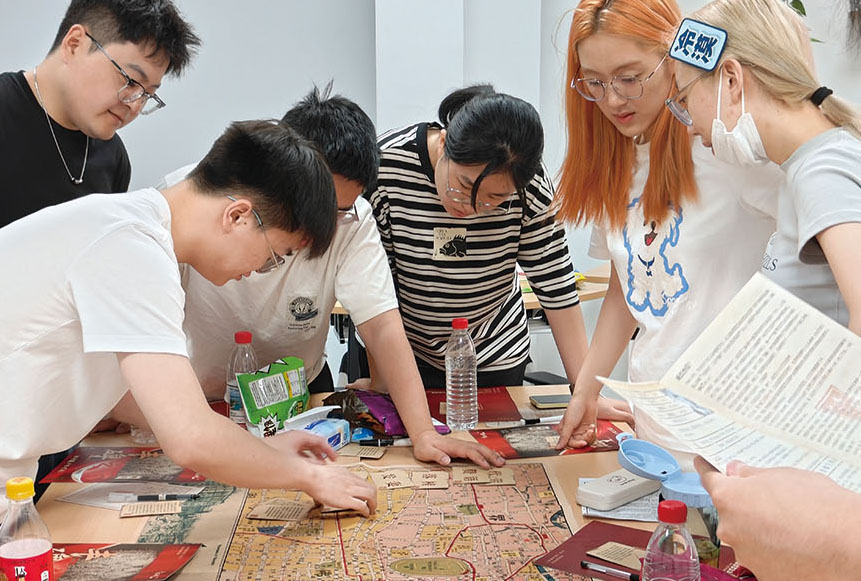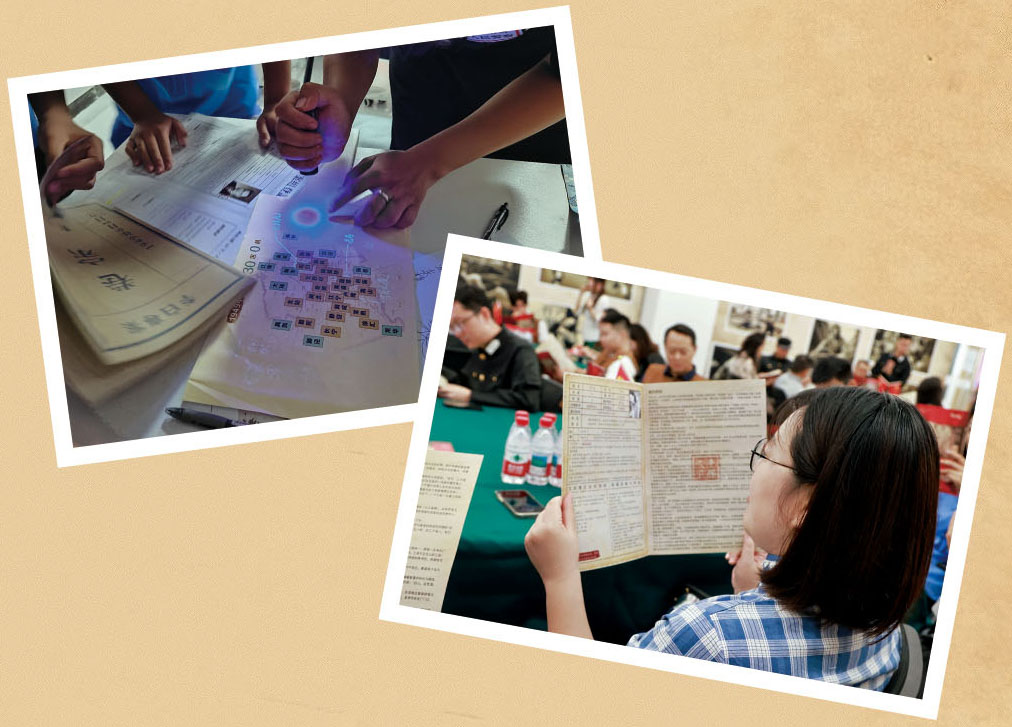A new wave of historical games is helping China's youth engage with the past through immersive storytelling, role-play, and research.

On Aug 29, a group of students gathered around a locked box in a classroom at the University of Science and Technology Beijing (USTB). When the lock clicked open, they discovered a booklet titled Truth, containing evidence of Japan's aggressive actions following the September 18 Incident of 1931.
This moment was part of the beta test for Dawn of Truth, the latest jubensha (scripted mystery game) developed by Hongfan, an educational technology company.
Set against the backdrop of the Chinese People's War of Resistance Against Japanese Aggression (1931-45), the game immerses players in a critical historical moment.
READ MORE: Gen Z's new rules on the dating game
Drawing inspiration from the "Nine Gentlemen" in Shenyang, Liaoning province — intellectuals who, in 1932, secretly compiled bilingual materials exposing Japan's crimes in Northeast China — the game highlights their efforts to rally international support for China's anti-aggression cause.
"I want to use methods that young people enjoy to bring history to life," said Cao Jiangbin, founder of Hongfan and organizer of the beta test. "They are interested in history; they just need a way to connect with it."
After years of working in youth education, Cao noticed the growing popularity of jubensha among Chinese young people in 2019. At the time, most scripted games focused on murder mysteries, with few exploring historical themes based on solid research.
"The appeal of these games lies in their immersive, narrative-driven nature," Cao explained. "I realized they could act as a 'container' for historical knowledge, turning passive listening into active exploration."
Two years later, Cao completed his first historical jubensha, A Pure Love for China, which tells the story of Li Bai, a legendary wireless operator for the Communist Party of China. Li was sent to Shanghai after Japanese militarists launched their full-scale invasion in 1937.
In the game, players take on the role of police officers searching for the secretly detained Li, following clues that retrace his steps.
"Heroes aren't just portraits on a wall; they're real people with stories we can relate to," Cao said. "Through the game, young people can experience the emotions and choices of historical figures, turning 'their story' into 'my story'."
To ensure historical accuracy, the team conducts thorough research before designing each game.
"While each player may be an ordinary person, we make sure their journey aligns with historical context and logic, with every element supported by evidence," explained Duan Xuchao, a 24-year-old marketing partner and game designer at Hongfan.
Duan said the team draws on historical materials and biographies from trusted sources, such as the Central Literature Publishing House, and consults experts from the Chinese Martyrs Glorification Promotion Association under the Ministry of Veterans Affairs.
"To avoid misinterpretation or factual errors, key historical figures are portrayed by hosts or professional NPCs (non-player characters) rather than players," Duan added.

Bring history to life
Xie Feifan, 27, an event organizer at Hongfan and a big fan of scripted games, noted that unlike traditional games, the team's creations are not just for entertainment — they are immersive tools for history education.
According to him, traditional jubensha games typically involve fewer than seven players. Hongfan, however, designs its games for larger groups, ranging from 12 to 48 participants. The mechanics have also been simplified so that each session lasts two to three hours instead of the usual four to six.
"We cater to the general public, not just hardcore fans. We want even first-time participants to jump right in," Xie said.
To further enhance the experience, the games feature period-accurate costumes and props.
In A Pure Love for China, for example, participants wear vintage uniforms, handle replica handguns, and even operate real telegraph machines. Players listen to the beeping of incoming messages and use a codebook to decode their hidden meaning.
"As cultural promoters, we want players to remember the heroes who sacrificed for the life we enjoy today — through engaging, interactive learning," Xie said.
In addition to jubensha, the team also develops board games.
Zhao Mengyi, one of the designers, created Seventeen Heroes, inspired by the 1942 Battle of Huangtian in Guangdong province, where 17 members of the Dongjiang Column, a Communist guerrilla unit, sacrificed their lives to protect civilians.
The game captures the harsh realities of war. Players are divided into different units and must complete tasks such as eliminating enemies, providing cover, and destroying secret documents — all under strict time limits.
"Just like on a real battlefield, the enemy doesn't wait while you plan," Zhao said. "This fast-paced, decision-driven environment helps young players understand the intelligence, courage, and hardships of those who fought before them."
Timeless echoes
Today, Hongfan has developed five jubensha games and 12 board games, hosting over 300 events each year, many of which involve university students.
"We also encourage young people to design their own games, and we support them in weaving historical knowledge into their creations," Duan explained.
One such project, Flames of Resistance, was created by students from USTB under the team's guidance. The board game features a unique "dual board" design: one side serves as the players' action area, while the other shows an actual historical map.
"While the outcomes can change based on player strategies, the historical map always moves forward — real history can't be reversed," Duan said.
ALSO READ: The rise of modern ceremonies
The design once left a 10-year-old boy deep in thought. At one point, he almost gave up because of the game's difficulty, but his parents encouraged him, "If it's this hard on paper, imagine how tough the real battles were."
Motivated, the boy pushed through to the end. "History isn't as simple as it looks in books," he told Duan. "I also want to become someone as remarkable as these heroes."
Duan emphasized that the games remain faithful to historical reality. In one scenario, despite the players' best efforts to save a hero, they couldn't change his tragic sacrifice. The realization left the room in profound silence.
"At that moment, the heroes weren't just names in a textbook — they became real people, companions who had lived and fought alongside the players," Duan said. "That emotional connection is far more powerful than any classroom lesson."
Contact the writer at mengwenjie@i21st.cn


